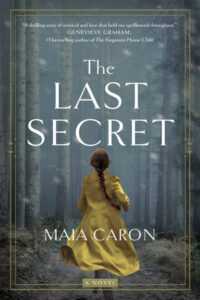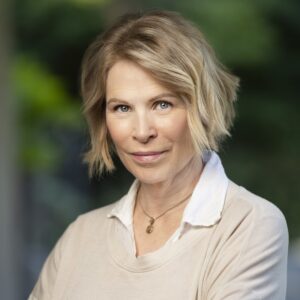War experiences, recovery from them
The Last Secret
by Maia Caron
Toronto: Doubleday Canada, 2024
$25.00 / 9780385688826
Reviewed by Jessica Poon
*
The Last Secret by Maia Caron is a tightly plotted, ambitious work of historical fiction that has fast-paced thriller elements and, at other times, the makings of a slow burn romance.

In it, there are two seemingly disparate plots that eventually converge. In plot A, which ever so slightly reminded me of Charlize Theron’s espionage thriller, Atomic Blonde, Savka Ivanets constantly lives in danger. Savka is a medic for the Ukrainian resistance and often must steal food and supplies. She is accompanied by her mother, sister, and son, Taras. When Taras is kidnapped by the KGB, she is given only one option for reuniting with her son—to spy on her husband, Markos, who has stolen the Rimini list that contains the names of more than eight thousand Ukrainian men. This covert operation that may save her son is continuously obstructed.
Along the way, Savka befriends Ewa, a Polish spy who pragmatically uses her sexuality to garner information. The dynamic between Savka and Ewa is sometimes Sapphic, as well as the most captivating in the whole novel. Ewa is matter-of-fact and blunt, baldly stating that the father of her child is a “Nazi prick.” Savka can hardly believe Ewa’s brazenness. Their personalities are drastically different, but their circumstances—separated from their children—are tragically similar, which makes them perfect foils to each other. This is how Vancouver Island resident Caron (Song of Batoche) introduces Ewa: “‘We took bets on what colour your eyes were,’ a woman said to Savka. ‘I was right—they’re brown!’ A thermometer was stuck rudely into her mouth. ‘I’m Ewa.’”
Savka gives birth to a daughter, Zoya, who Markos treats abominably. He suspects, despite Savka’s vociferous dissent, that Zoya is not his daughter by blood.

In plot B, Jeanie Esterhazy, referred to in newspapers and tabloids as the Fire Bride, is a heavily scarred artist on Salt Spring Island who can’t bear to be around a stove. The only company she has is her dog, Tuna, and Pat, a nurse who administrates powerful sedatives without Jeanie’s knowledge and also serves as Jeanie’s art dealer. When Jeanie finds out that Pat has been lying about her art sales, she becomes determined to escape her nurse’s tyranny. While Plot A takes place in the 1940s and is told in third person and past tense, Plot B takes place in 1972 and is told in first person and present tense, creating an immediacy that is occasionally absent in the arguably more action-packed Plot A.
When a journalist for the Vancouver Sun decides to personally question Jeanie at her remote estate, left to her by her Aunt Suze, Pat doesn’t want Jeanie to be alone with him. Naturally Pat’s trepidation is suspicious. As far as evil nurse archetypes go, Pat is an exemplar. The journalist seems determined to extract information about Markos Ivanets, who changed his name to Markos Kovacs upon immigrating to Canada. The specifics surrounding Jeanie’s accident that resulted in her severe burns, and the loss of her husband, are withheld from the reader for a long time. What could Jeanie possibly know about Markos? Jeanie finds herself recalling snatches, but not a completely trustworthy memory. Caron is not afraid to let suspense build seemingly interminably, only to unveil a dénouement she carefully metes out.
When Savka realizes what her incomplete memories—later filled in—reveal, it is momentous and devastating. In the informative author’s note, Caron reveals that her editor said, “You’re going to give Savka a voice.” Caron writes, “The voice you hear in Savka is me trying to heal… Perhaps the last secret I tell in this story is my own.” Savka’s secret—and Caron’s—are powerfully wrought.
In the end, when every character’s motivations finally become clear to each other, it feels like a satisfying puzzle, with a moderate heaping of wish fulfillment, clicking into place.
[Editor’s note: Maia Caron is joined by Alix Ohlin on Sept 25, 7pm, Vancouver Central Library. She reads at Victoria’s Munro Books (11am) on September 28 and Duncan’s Volume One Books (11am) on October 12.]

*

Originally from East Vancouver, Jessica Poon is a writer, former line cook, and pianist of dubious merit who recently returned to BC after completing a MFA in Creative Writing at the University of Guelph. [Editor’s note: Jessica Poon has recently reviewed books by Terese Svoboda, Wendy H. Wong, Andromeda Romano-Lax, Sarah Leipciger, Katrina Kwan, Shelley Wood, Richard Kelly Kemick, Elisabeth Eaves, Rajinderpal S. Pal, Keziah Weir, Amber Cowie, Robyn Harding, Roz Nay, Anne Fleming, Miriam Lacroix, Taslim Burkowicz, Sam Wiebe, Amy Mattes, Louis Druehl, Sheung-King, Loghan Paylor, Lisa Moore (ed.), Sandra Kelly, and Robyn Harding for BCR]
*
The British Columbia Review
Interim Editors, 2023-25: Trevor Marc Hughes (non-fiction), Brett Josef Grubisic (fiction and poetry)
Publisher: Richard Mackie
Formerly The Ormsby Review, The British Columbia Review is an online book review and journal service for BC writers and readers. The Advisory Board now consists of Jean Barman, Wade Davis, Robin Fisher, Barry Gough, Hugh Johnston, Kathy Mezei, Patricia Roy, Maria Tippett, and Graeme Wynn. Provincial Government Patron (since September 2018): Creative BC. Honorary Patron: Yosef Wosk. Scholarly Patron: SFU Graduate Liberal Studies. The British Columbia Review was founded in 2016 by Richard Mackie and Alan Twigg.
“Only connect.” – E.M. Forster
3 comments on “War experiences, recovery from them”